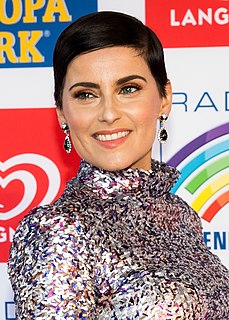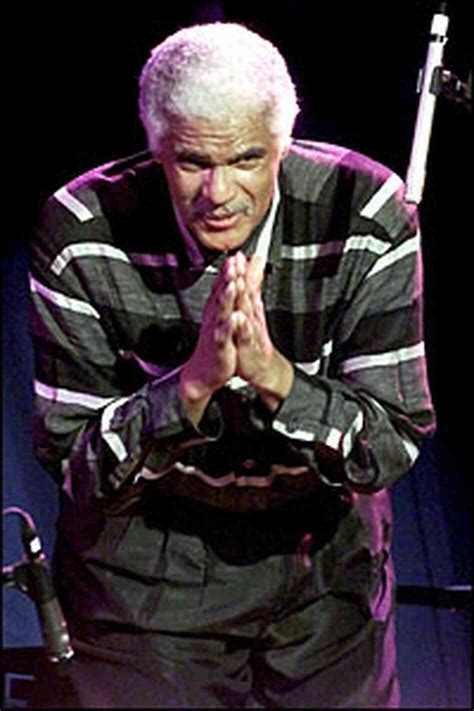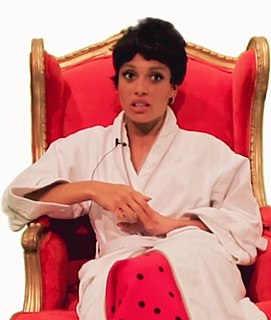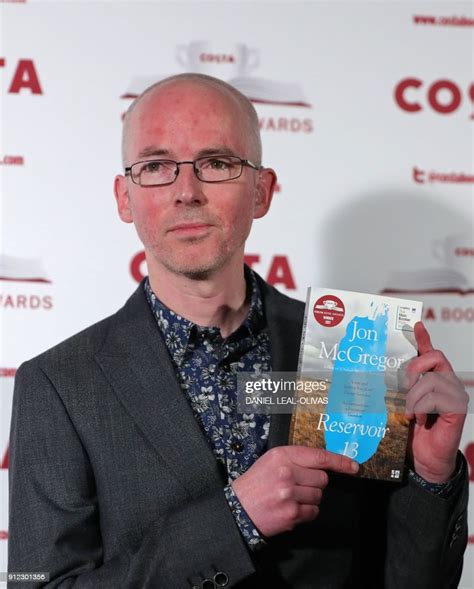A Quote by Ezra Pound
The Garden En robe de parade. - Samain Like a skein of loose silk blown against a wall She walks by the railing of a path in Kensington Gardens, And she is dying piece-meal of a sort of emotional anaemia. And round about there is a rabble Of the filthy, sturdy, unkillable infants of the very poor. They shall inherit the earth. In her is the end of breeding. Her boredom is exquisite and excessive. She would like some one to speak to her, And is almost afraid that I will commit that indiscretion.
Related Quotes
When she walks she walks with passion when she talks, she talks like she can handle it when she asks for something, boy she means it she know you would do [anything] to keep her by your side she'll make you work hard make you spend hard make you want all, all of her she'll make you fall real fast [in love].
The woman turned and went slowly into the house. As she passed the doors she turned and looked back. Grave and thoughtful was her glance, as she looked on the king with cool pity in here eyes. Very fair was her face, and her long hair was like a river of gold. Slender and tall she was in her white robe girt with silver; but strong she seemed and stern as steel, a daughter of kings.
These bright roofs, these steep towers, these jewel-lakes, these skeins of railroad line - all spoke to her and she answered. She was glad they were there. She belonged to them and they to her. . . . She had not lost it. She was touching it with her fingertips. This was flying: to go swiftly over the earth you loved, touching it lightly with your fingertips, holding the railroads lines in your hand to guide you, like a skein of wool in a spider-web game - like following Ariadne's thread through the Minotaur's maze, Where would it lead, where?
I love her for what she has dared to be, for her hardness, her cruelty, her egoism, her perverseness, her demoniac destructiveness. She would crush me to ashes without hesitation. She is a personality created to the limit. I worship her courage to hurt, and I am willing to be sacrificed to it. She will add the sum of me to her. She will be June plus all that I contain.
She [Joni Mitchell] wanted to have that (jazz) element in her music. Of course, when she heard Jaco's [Jaco Pastorius'] music and met him, that floored her -- really grabbed her. She decided that Wayne Shorter was really conducive to her music. She would speak metaphorically about things. "I want this to sound like a taxicab driver, or a taxi in New York," or "I want this to sound like a telephone ringing." She would speak to musicians like that, and we really tuned into what she would want our music to be.
I wondered about Mrs. Winterbottom and what she meant about living a tiny life. If she didn't like all that baking and cleaning and jumping up to get bottles of nail polish remover and sewing hems, why did she do it? Why didn't she tell them to do some of the things themselves? Maybe she was afraid there would be nothing left for her to do. There would be no need for her and she would become invisible and no one would notice.
She sat leaning back in her chair, looking ahead, knowing that he was as aware of her as she was of him. She found pleasure in the special self-consciousness it gave her. When she crossed her legs, when she leaned on her arm against the window sill, when she brushed her hair off her forehead - every movement of her body was underscored by a feeling the unadmitted words for which were: Is he seeing it?
I've been afraid of being Cansrel,' she said aloud to her reflection. 'But I'm not Cansrel.' At her elbow, Musa said blandly, 'Any one of us could have told you that, Lady.' Fire looked at the captain of her guard and laughed, because she wasn't Cansrel- she wasn't anyone but herself. She had no one's path to follow; her path was her own to choose.
She came into a room; she stood, as he had often seen her, in a doorway with lots of people round her. But it was Clarissa one remembered. Not that she was striking; not beautiful at all; there was nothing picturesque about her; she never said anything specially clever; there she was however; there she was.
She was beautiful, but not like those girls in the magazines. She was beautiful, for the way she thought. She was beautiful, for the sparkle in her eyes when she talked about something she loved. She was beautiful, for her ability to make other people smile, even if she was sad. No, she wasn't beautiful for something as temporary as her looks. She was beautiful, deep down to her soul. She is beautiful.
How shall I ever tell Aunt Shaw?' she whispered, after some time of delicious silence. 'Let me speak to her.' 'Oh, no! I owe it to her, - but what will she say?' 'I can guess. Her first exclamation will be, "That man!" ' 'Hush!' said Margaret, 'or I shall try and show you your mother's indignant tones as she says, "That woman!"
Eventually she came. She appeared suddenly, exactly like she'd done that day- she stepped into the sunshine, she jumped, she laughed and threw her head back, so her long ponytail nearly grazed the waistband of her jeans. After that, I couldn't think about anything else. The mole on the inside of her right elbow, like a dark blot of ink. The way she ripped her nails to shreds when she was nervous. Her eyes, deep as a promise. Her stomach, pale and soft and gorgeous, and the tiny dark cavity of her belly button. I nearly went crazy.
Madame Bovary is one my favorite novels. Emma Bovary will always be an enigma, but as the years pass, I feel that I understand her better. She has a violent nostalgia, almost an infantile nostalgia, to be understood by the men surrounding her. I like her relentless fight for independence, her rebellion against the mediocre, and her quest for the sublime, even if she burns her wigs in the process. I like that Flaubert never judges her morally for her self-destructiveness, for her desperate attempt to satisfy her wildest desires and appetites.
One of my aunties inspires me beause of how easily she shows her emotions, and she isn't ever afraid to cry. My mum, for her work ethic - she might not show her emotions in public very much, but she's a total power woman. My grandma, who watched four of her children die before her, she's a powerhouse.
He thinks about her, at this moment, in her house, a few thin walls away, packing her life into boxes and bags and he wonders what memories she is rediscovering, what thoughts are catching in her mouth like the dust blown from unused textbooks. He wonders if she has buried any traces of herself under her floorboards. He wonders what those traces would be if she had. And he wonders again why he thinks about her so much when he knows so little to think about.







































